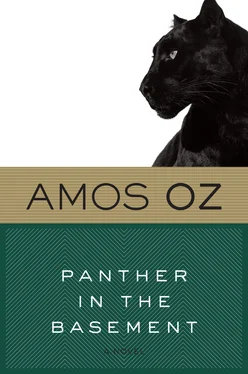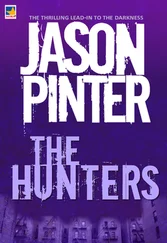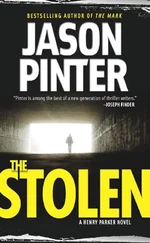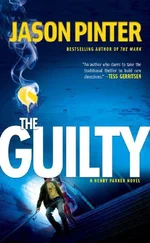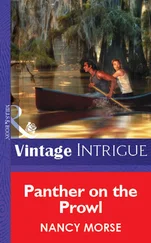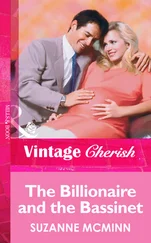I didn't give up:
"But right at the end, will we forgive our enemies or not?" I had an image in my head at that moment, a precise, concrete, detailed image: Father and Mother and Sergeant Dunlop sitting in this room on Saturday morning. Drinking tea and chatting in Hebrew about the Bible and archeological sites in Jerusalem, arguing in Latin or classical Greek about Greeks bearing gifts. And Yardena and I in a corner of the picture: she playing the clarinet and I lying on the rug not far from her feet, a happy panther in the basement.
My mother said:
"Yes, we will. Not forgiving is like a poison."
I ought to go and beg Yardena's pardon for what I nearly didn't see, not on purpose. For the thoughts that had come to me since then. But how could I? To beg her pardon I'd have to tell her what happened, and the story itself was a kind of betrayal. So that begging Yardena's pardon would be a kind of betrayal of a betrayal? Complicated. Does betrayal of a betrayal cancel out the original betrayal? Or does it make it twice as bad?
That's quite a question.
You must never take a wounded Underground fighter to the hospital, because that is the first place the CID will rush to after any operation, in search of injured fighters. That is why the Underground has its own secret dressing stations for taking care of the injured, and one of these was our apartment, because my mother studied nursing at the Hadassah Hospital when she first arrived in the country. (She studied for only two years, though, because in the second year she got married and in the third year I was born, thus cutting short her studies.)
There was a locked drawer in the bathroom cupboard. I was not allowed to ask what was in it or even to notice that it was kept locked. But once, when my parents were at work, I carefully broke into it (with a bent piece of wire), and discovered a stock of bandages, dressings, syringes, various packages of pills, jars, sealed bottles, ointments with foreign writing on them. And I knew that if some night in the middle of curfew I heard a furtive scraping at the door, followed by hushed voices, whispers, the scratch of a match on a matchbox, the whistling of the kettle, I was not to leave my room. Not to see the spare mattress spread out on the floor of the hallway under the big maps, which would have disappeared without trace by the morning. As though I had been dreaming. Not knowing is one of the hardest duties of an Underground man.
My father was almost blind in the dark, which is why he was never involved in night raids on barricades or fortified police stations. But he had a special task: it was to compose slogans in English denouncing Perfidious Albion, which had committed itself publicly to help us build a Jewish homeland here, and was now, in an act of cynical betrayal, helping the Arabs to crush us. I asked my father what cynical betrayal meant. (Whenever Father explained a foreign idea to me he looked concentrated, responsible, like a scientist pouring a precious fluid from one test tube to another.) He said:
"Cynical: cold and calculated. Selfish. The word comes from kyon, the ancient Greek word for a dog. When a suitable opportunity presents itself I shall explain to you the connection between cynicism and dogs, which ironically enough are normally considered to symbolize loyalty. It is rather a long story, testifying to the ingratitude of men toward those animals most useful to them, such as the dog, the mule, the horse, the donkey, which have become terms of abuse, whereas dangerous wild beasts, such as the lion, the tiger, the wolf, and even the scavenging vulture, receive undeserved respect in most languages. Anyway, to come back to your question, cynical betrayal is cold-blooded, immoral, and unfeeling betrayal."
I asked (myself, not Father): Is there any betrayal that is not cynical? That is not selfish and calculated. Is there such a thing as a traitor who is not low-down? (Today I think there is.)
In Father's English slogans for the Underground, Perfidious Albion was accused of continuing the crimes of the Nazis, of selling the last hopes of a decimated nation for Arab oil and military bases in the Middle East.
"The people of Milton and Lord Byron should realize that the oil that warms them in winter is stained with the spilled blood of the survivors of the persecuted people." "The British Labour Government is sucking up to corrupt Arab regimes that are constantly moaning that they don't have enough space between the Atlantic Ocean and the Persian Gulf and from Mount Ararat in the north to Bab el-Mandeb in the deepest south." (I checked on the map: they were really not short of space. Our land was a tiny dot in the vast expanse of the Arab world, a pinhead in the British Empire.) When we finished building our rocket, we would aim it at the King's palace in the heart of London, and force them to get out of our land. (And what would happen to Sergeant Dunlop? He loved the Bible and us. Would he get permission to stay here, as a special honored guest of the Hebrew State? I'd make sure of it. I'd write a reference for him.)
Father wrote his slogans at night, when he wasn't researching the history of the Jews. He quoted lines of English poetry in them, to stir their hearts. In the morning on his way to work he handed the sheet of paper, concealed inside his newspaper, to his contact man (the boy who looked like a stork and helped in the Sinopsky Brothers grocery). The slogans were then taken to the secret printing press (in the Kolodnys' cellar). A couple of days later they appeared on walls of buildings, on lampposts, and even on the walls of the police station where Sergeant Dunlop was based.
If the CID discovered Mother's locked drawer or the drafts of Father's slogans, the two of them would be imprisoned in the Russian Compound, and I would be left on my own. I would go away to the mountains and live the life of a mountain boy.
I saw a film at the Edison Cinema about a gang of counterfeiters: a whole family, brothers, cousins, and in-laws. When I got home I asked Mother if we were also a family of outlaws. She said:
"What have we done? Have we robbed anybody? Have we cheated anybody? Have we shed anybody's blood, heaven forbid?"
And Father:
"Certainly not. On the contrary: British law is actually illegal. Their very rule here rests on repression and falsehood, because they were given Jerusalem by the nations of the world on the basis of their commitment to establish a Jewish national home, and now they are urging the Arabs on to destroy this home and even helping them to do it." As he spoke, anger blazed in his blue eyes, which were magnified by the lenses of his glasses. My mother and I exchanged covert glances, because Father's anger was a gentle, literary anger. Driving out the British and repelling the Arab armies required a different sort of anger, a savage anger far from words, a kind of anger that did not exist in our home or in our neighborhood. Maybe it existed only in Galilee, in the valleys, in the kibbutzim in the Negev, in the mountains where every night the fighters of the real Underground trained. Maybe in those places the right sort of anger was building up. We didn't know what that anger was, but we did know that without it we were all doomed. Out there, in the desert, in the plain, on the Carmel range, in the burning valley of Beit Shean, a new breed of Jews was growing up, who were not pale and bespectacled like us but bronzed and strong; they were pioneers, and they had wellsprings of the real, murderous kind of anger. The indignant anger that occasionally flashed from Father's glasses made Mother and me smile imperceptibly. Less than a wink. A mini-conspiracy, an Underground within the Underground, as though for an instant she had opened a forbidden drawer in my presence. As though she was hinting to me that there were certainly two adults and a child in the room, but that in her mind at least I was not necessarily the child. Not all the time, anyway. I suddenly went over and hugged her hard while Father was switching on his desk lamp and sitting down to go on gathering facts for his history of the Jews in Poland. So why was the sweetness of that moment mingled with the sour sense of squeaking chalk, the dull taste of treachery?
Читать дальше
